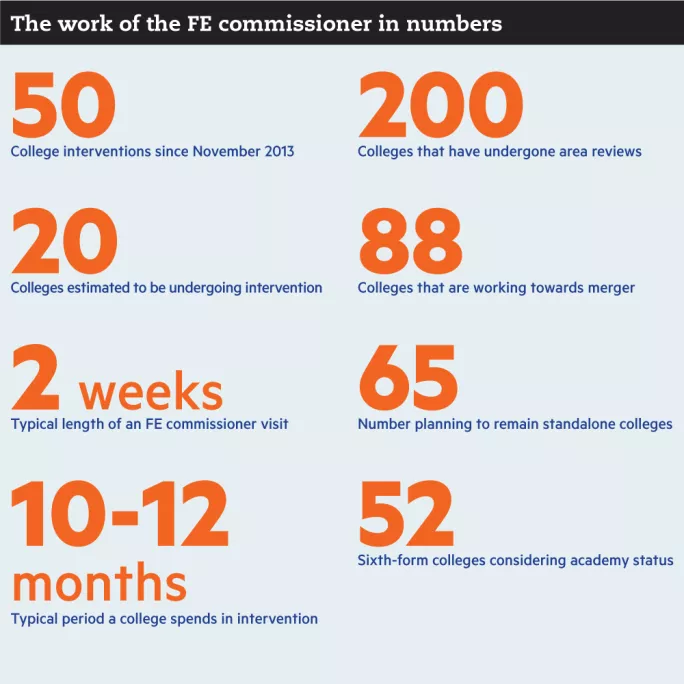Area reviews ‘not the end of the story’ for mergers

“Significant” continuing pressures on funding will result in many colleges being forced to specialise to survive, the new FE commissioner has predicted.
In his first interview with TES since being appointed last month, Richard Atkins also warned that he did not expect the area reviews to be “the end of the story”, with “limited” funding likely to lead to more mergers, even after the process ends in the spring.
The former Exeter College principal said he expected that some proposals made in the earlier area reviews would not come to fruition, with a number of institutions unlikely to be able to “implement what they’ve agreed to”.
He also said there was a “case to answer” about small school sixth forms and acknowledged that, in some cases, the low quality and limited range of qualifications on offer was a “real problem”.
Providers ‘on their own’
In March, then skills minister Nick Boles told college leaders that they could not afford to “sit out these area reviews” and “see how the chips fall”.
He insisted that once the pot of restructuring funding had run out, colleges would be “basically on your own”.
At the Association of Colleges’ (AoC) annual conference in Birmingham last week, Mr Atkins said that, of the 200 colleges that had already been through the area review process, 88 were working towards merger, with 65 planning to remain as standalone institutions.
Mr Atkins, a former president of the AoC, told TES that the area reviews were on schedule to finish by the end of March. But he also insisted that this would not be “the end of the story”.
“I think you’ll have colleges that are unable, for various reasons, to implement what they’ve agreed to. They will need support; there will be a few of those. And, sadly, there will be a few colleges that will probably still require intervention.
“From what I heard the secretary of state say…resources will be limited. Therefore, collaboration will be the only way to effectively provide resources for the learners who need them. You particularly think of levels 4 and 5, and think of resource-hungry areas like construction and engineering. I do not think, over time, as many colleges will be able to operate in all these areas at all these levels.”

Ian Pretty, chief executive of the Collab Group of colleges, said Mr Atkins’ comments were “helpful”. He added: “We agree that specialism is a likely way forward for colleges, especially at levels 3, 4 and 5 and in sectors of great economic impact that experience the greatest skills shortages, such as construction.
“We also see the rise of regional college groups, as seen in the devolved nations, as a productive model for English colleges.”
The Department for Education announced last month that Mr Atkins would be taking over from Sir David Collins, who had held the role of FE commissioner since November 2013. Mr Atkins retired as principal of Exeter College in April. The college was the first to be rated “outstanding: under a pilot “no notice” inspection by Ofsted in 2012, before the verdict was confirmed two years later.
He told TES that the ongoing area reviews were a “reasonably well-oiled machine”, adding: “By bringing people around the table with the local enterprise partnership and the local authority, with accurate data and sharing it, we’re opening up a box that hasn’t been opened since 1992 - or maybe even ever before. I think that’s a positive thing.”
‘A case to answer’
But Mr Atkins acknowledged concerns about the absence of school sixth forms from the review process. In September, the AoC and Havering Sixth Form College jointly initiated a judicial review, challenging the Department for Education’s decision to fund a new school sixth form in East London. The government subsequently withdrew its decision in an out-of-court settlement after the school shelved its plans.
The commissioner said that he was aware of issues with small sixth forms in “almost every area” of the country.
“There are very small school sixth forms that are not providing young people with the skills and qualifications required,” he added. “So they are turning up at college at 17 or 18…and they’ve not made the progress and they’ve not achieved their potential.
“I think there is a case to answer on small sixth forms…I’m not convinced that school sixth forms that are very small can offer either the quality or range of curriculum. That is a real problem.”
AoC chief executive David Hughes said he would support an area review process for school sixth forms, with smaller ones struggling to provide a “high-quality and broad curriculum”. He added: “We know that more than half of school sixth forms recruited less than 100 students last year, which also makes it hard to be financially viable.”
You need a Tes subscription to read this article
Subscribe now to read this article and get other subscriber-only content:
- Unlimited access to all Tes magazine content
- Exclusive subscriber-only stories
- Award-winning email newsletters
Already a subscriber? Log in
You need a subscription to read this article
Subscribe now to read this article and get other subscriber-only content, including:
- Unlimited access to all Tes magazine content
- Exclusive subscriber-only stories
- Award-winning email newsletters